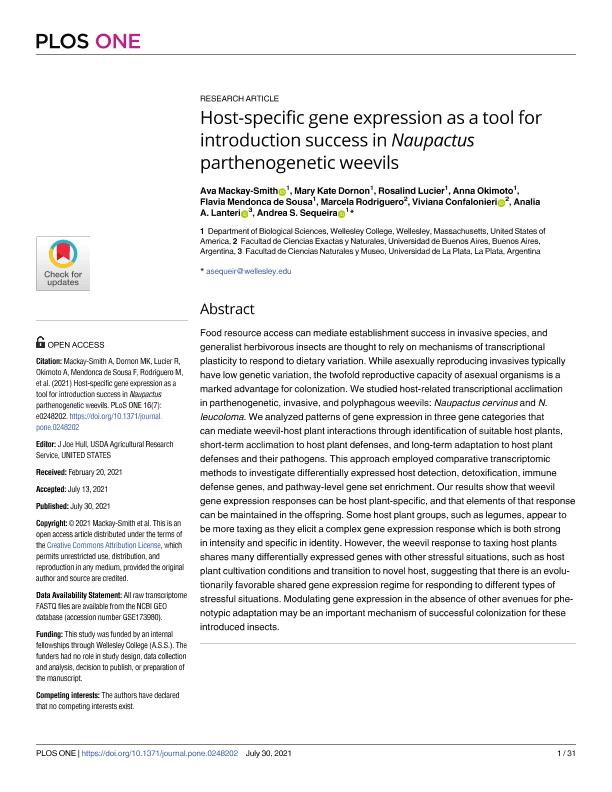Mostrar el registro sencillo del ítem
dc.contributor.author
Mackay Smith, Ava

dc.contributor.author
Dornon, Mary Kate
dc.contributor.author
Lucier, Rosalind
dc.contributor.author
Okimoto, Anna
dc.contributor.author
Sousa, Flavia Mendonca de
dc.contributor.author
Rodriguero, Marcela Silvina

dc.contributor.author
Confalonieri, Viviana Andrea

dc.contributor.author
Lanteri, Analia Alicia

dc.contributor.author
Sequeira, Andrea

dc.date.available
2022-01-20T13:28:11Z
dc.date.issued
2021-07-30
dc.identifier.citation
Mackay Smith, Ava; Dornon, Mary Kate; Lucier, Rosalind; Okimoto, Anna; Sousa, Flavia Mendonca de; et al.; Host-specific gene expression as a tool for introduction success in Naupactus parthenogenetic weevils; Public Library of Science; Plos One; 16; 7; 30-7-2021; 1-31
dc.identifier.issn
1932-6203
dc.identifier.uri
http://hdl.handle.net/11336/150416
dc.description.abstract
Food resource access can mediate establishment success in invasive species, and generalist herbivorous insects are thought to rely on mechanisms of transcriptional plasticity to respond to dietary variation. While asexually reproducing invasives typically have low genetic variation, the twofold reproductive capacity of asexual organisms is a marked advantage for colonization. We studied host-related transcriptional acclimation in parthenogenetic, invasive, and polyphagous weevils: Naupactus cervinus and N. leucoloma. We analyzed patterns of gene expression in three gene categories that can mediate weevil-host plant interactions through identification of suitable host plants, short-term acclimation to host plant defenses, and long-term adaptation to host plant defenses and their pathogens. This approach employed comparative transcriptomic methods to investigate differentially expressed host detection, detoxification, immune defense genes, and pathway-level gene set enrichment. Our results show that weevil gene expression responses can be host plant-specific, and that elements of that response can be maintained in the offspring. Some host plant groups, such as legumes, appear to be more taxing as they elicit a complex gene expression response which is both strong in intensity and specific in identity. However, the weevil response to taxing host plants shares many differentially expressed genes with other stressful situations, such as host plant cultivation conditions and transition to novel host, suggesting that there is an evolutionarily favorable shared gene expression regime for responding to different types of stressful situations. Modulating gene expression in the absence of other avenues for phenotypic adaptation may be an important mechanism of successful colonization for these introduced insects.
dc.format
application/pdf
dc.language.iso
eng
dc.publisher
Public Library of Science

dc.rights
info:eu-repo/semantics/openAccess
dc.rights.uri
https://creativecommons.org/licenses/by/2.5/ar/
dc.subject
HOST SPECIFIC
dc.subject
GENE EXPRESSION
dc.subject
PARTHENOGENESIS
dc.subject
WEEVILS
dc.subject.classification
Bioquímica y Biología Molecular

dc.subject.classification
Ciencias Biológicas

dc.subject.classification
CIENCIAS NATURALES Y EXACTAS

dc.title
Host-specific gene expression as a tool for introduction success in Naupactus parthenogenetic weevils
dc.type
info:eu-repo/semantics/article
dc.type
info:ar-repo/semantics/artículo
dc.type
info:eu-repo/semantics/publishedVersion
dc.date.updated
2022-01-06T14:53:07Z
dc.journal.volume
16
dc.journal.number
7
dc.journal.pagination
1-31
dc.journal.pais
Estados Unidos

dc.journal.ciudad
San Francisco
dc.description.fil
Fil: Mackay Smith, Ava. Wellesley College; Estados Unidos
dc.description.fil
Fil: Dornon, Mary Kate. Wellesley College; Estados Unidos
dc.description.fil
Fil: Lucier, Rosalind. Wellesley College; Estados Unidos
dc.description.fil
Fil: Okimoto, Anna. Wellesley College; Estados Unidos
dc.description.fil
Fil: Sousa, Flavia Mendonca de. Wellesley College; Estados Unidos
dc.description.fil
Fil: Rodriguero, Marcela Silvina. Consejo Nacional de Investigaciones Científicas y Técnicas; Argentina. Universidad de Buenos Aires. Facultad de Ciencias Exactas y Naturales; Argentina
dc.description.fil
Fil: Confalonieri, Viviana Andrea. Consejo Nacional de Investigaciones Científicas y Técnicas; Argentina. Universidad de Buenos Aires. Facultad de Ciencias Exactas y Naturales; Argentina
dc.description.fil
Fil: Lanteri, Analia Alicia. Consejo Nacional de Investigaciones Científicas y Técnicas. Centro Científico Tecnológico Conicet - La Plata; Argentina. Universidad Nacional de La Plata. Facultad de Ciencias Naturales y Museo. División Entomología; Argentina
dc.description.fil
Fil: Sequeira, Andrea. Wellesley College; Estados Unidos
dc.journal.title
Plos One

dc.relation.alternativeid
info:eu-repo/semantics/altIdentifier/url/https://journals.plos.org/plosone/article?id=10.1371/journal.pone.0248202
dc.relation.alternativeid
info:eu-repo/semantics/altIdentifier/doi/https://doi.org/10.1371/journal.pone.0248202
Archivos asociados
